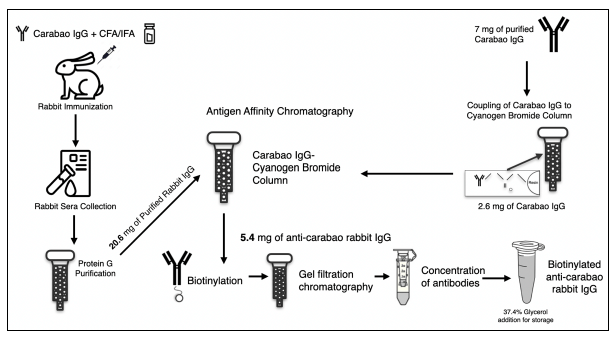Polyclonal anti-carabao antibody production for immunoassay applications*
Ernest Troyss B. Pilapil

Carabaos (Bubalus bubalis) play a significant role in the Philippines’ rural economy. It is utilized as a source of draft power in farming, meat, and milk production. However, carabaos are also intermediate hosts for some parasites, such as Schistosoma japonicum. To capitalize on carabaos for their economic benefits, it is critical that we also develop vaccines to prevent carabaos from serving as conduits for spreading infectious parasites that can affect human health.
Vaccine development entails cognate immunoassays for the assessment of the efficacy and magnitude of the host immune response. Thus, it is necessary for appropriate reagents for these immunoassays to be available. Currently, the closest antibody used for carabao-related immunoassays is an anti-bovine (Bos taurus) antibody.
We hypothesize that using an anti-bovine-detecting antibody for immunoassays targeted at detecting carabao antibodies may not reflect accurate measures of the carabao host immune response. Therefore, in this study, we developed a protocol for producing biotinylated monospecific rabbit anti-carabao IgG polyclonal antibodies for immunoassay applications.
The anti-carabao antibodies were purified by Protein G affinity chromatography and by cyanogen bromide-activated Sepharose (CNBS) column chromatography. SDS-PAGE was used to confirm antibody purity, and enzyme-linked immunoassay (ELISA) was used to test its binding affinity. We then compared the efficacy of the anti-carabao antibody as a secondary reagent in ELISA to a commercially available anti-bovine rabbit IgG-HRP to detect anti-Sj97 antibodies in the sera of vaccinated carabaos.
Interestingly, the biotinylated polyclonal anti-carabao rabbit antibody exhibited higher specificity and predictive values for detecting anti-Sj97 carabao antibodies in a pilot vaccine study (100% sensitivity, 100% specificity, 100% PPV, and 100% NPV). To our knowledge, this is the first anti-carabao antibody production protocol developed in the Philippines. Further studies are recommended to fully utilize this strategy for immunological research on carabaos in the Philippines.
__________
*In collaboration with Dr. Mario Jiz, Immunology Department, Research Institute for Tropical Medicine
